朗文国际英语二册5单元 形容词比较级
形容词比较级的变化规则口诀
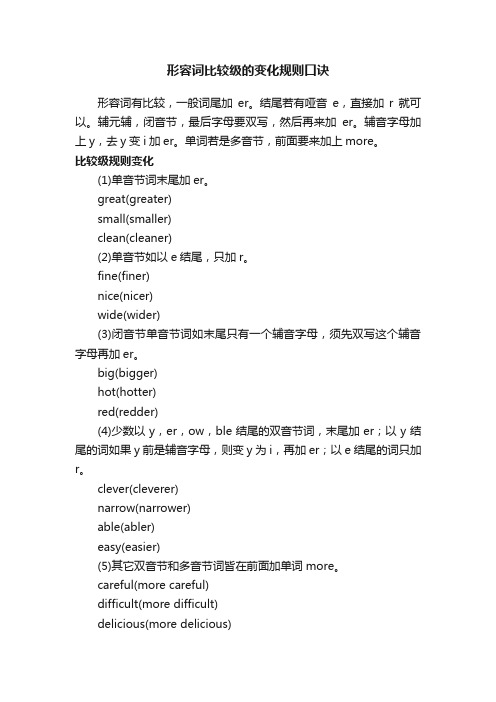
形容词比较级的变化规则口诀
形容词有比较,一般词尾加er。
结尾若有哑音e,直接加r就可以。
辅元辅,闭音节,最后字母要双写,然后再来加er。
辅音字母加上y,去y变i加er。
单词若是多音节,前面要来加上more。
比较级规则变化
(1)单音节词末尾加er。
great(greater)
small(smaller)
clean(cleaner)
(2)单音节如以e结尾,只加r。
fine(finer)
nice(nicer)
wide(wider)
(3)闭音节单音节词如末尾只有一个辅音字母,须先双写这个辅音字母再加er。
big(bigger)
hot(hotter)
red(redder)
(4)少数以y,er,ow,ble结尾的双音节词,末尾加er;以y结尾的词如果y前是辅音字母,则变y为i,再加er;以e结尾的词只加r。
clever(cleverer)
narrow(narrower)
able(abler)
easy(easier)
(5)其它双音节和多音节词皆在前面加单词more。
careful(more careful)
difficult(more difficult)
delicious(more delicious)
比较级不规则变化
有些词的比较级变化不规则,则需要特殊记忆。
good/well(better)
bad(worse)
many/much(more)
little(less)
far(farther)。
形容词比较级和最高级变化规则

形容词比较级和最高级变化规则形容词级的变化规律和级的用法:一、形容词级的变化:1、规律变化:单音词的变化:(四条)①一般情况:+er(比较级) +est(最高级)eg :quiet--quieter--the quietestbright--brighter---the brightest 明亮/聪明的dear--dearest--the dearestclever--cleverer--the cleverest②词末为--e(不发音)+ r --+steg:fine--finer--the finestnice--nicer--the nicestcute--cuter--the cutestclose--closer--the closestwhite--whiter--the whitestlarge--larger--the largestfree--freer--freest(特殊)③重读闭音节,末尾只有一个辅音字母的:双写辅音字母+er--双写辅音字母+esteg:hot--hotter--the hottestbig --bigger--the biggestred--redder--the reddestwet--wetter--the wettestsad--sadder--the saddestfat--fatter--the fattestthin--thinner--the thinnestfit--fitter--fittest④少数以辅音字母+y结尾的双音节原根词:变y为i+er 变y为i+est形容词和副词用法比较形容词和副词形容词和副词在语法结构中主要用于比较级和最高级。
形容词和副词的构成形式基本上一样,它们的形式与单音节、双音节和多音节有关,当然还有其特殊形式。
形容词和副词比较级的基本用法分为同级比较、比较级和最高级三种形式。
但这三种形式都有它们特殊的表达方式以及它们的惯用法。
形容词比较级和最高级

形容词比较级和最高级形容词比较级和最高级是英语语法中的重要部分。
它们被用于对两个或多个事物进行比较,从而表达它们的差异或者程度。
掌握形容词比较级和最高级的用法,可以帮助我们更准确地描述事物,在表达自己的观点和比较中起到关键作用。
一、形容词比较级形容词比较级用来对两个事物进行比较,表示其中一方的程度更高或更低。
在形成比较级时,常在形容词前加上-er或者在前面加more来构成。
1. 单音节和部分双音节词的比较级形式大部分单音节形容词可直接在词尾加-er来构成比较级。
例如:- tall(高)- taller(更高)- short(矮)- shorter(更矮)- old(老)- older(更老)部分双音节形容词同样可以在词尾加-er形成比较级,例如:- clever(聪明)- cleverer(更聪明)- narrow(狭窄)- narrower(更狭窄)2. 长双音节和多音节词的比较级形式长双音节和多音节形容词通常在词前加上more来表示比较级。
例如:- interesting(有趣的)- more interesting(更有趣的)- beautiful(美丽的)- more beautiful(更美丽的)- comfortable(舒适的)- more comfortable(更舒适的)3. 比较级的用法除了形容词比较级的形式,我们还需要注意其用法。
a) 比较两者时,常使用than连接。
例如:- My house is bigger than yours.(我的房子比你的大。
)- This book is more expensive than that one.(这本书比那本贵。
)b) 比较级可以修饰一个名词或者一个句子。
例如:- She is smarter than her classmates.(她比她的同学们更聪明。
)- It was colder yesterday than it is today.(昨天比今天冷。
形容词副词的比较级和最高级

3. ---Have you decided which you’d like to buy, the black shirt or the yellow one? ---The black one. Because it is _______ of the two.
The green oranges are big. The orange ones are bigger. The red ones are the biggest of all.
250,000 RMB.
500 RMB 50,000 RMB.
The bike is expensive. The red cat is more expensive than the bike. The green car is the most expensive.
better the chicken 7. Which do you think tastes________, or the fish? (good)
8. Who runs faster _____, Tom or Jim? (fast)
1. The environment in our hometown is _____ than it was before. • good B. worse C. better D. bad
5. Alice writes well. Mary writes _________________
1. ---Who’s ______ basketball player in China now? Is it Yao Ming? ---No. It’s Sun Mingming. A. tall B. taller C. the tallest 2. English is one of ______ imporant subjects in our school. A. most B. the most C. more D. much more
形容词比较级和最高级课件
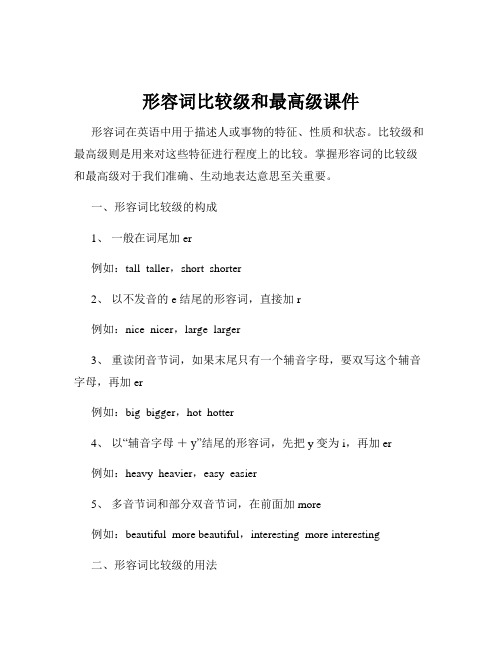
形容词比较级和最高级课件形容词在英语中用于描述人或事物的特征、性质和状态。
比较级和最高级则是用来对这些特征进行程度上的比较。
掌握形容词的比较级和最高级对于我们准确、生动地表达意思至关重要。
一、形容词比较级的构成1、一般在词尾加 er例如:tall taller,short shorter2、以不发音的 e 结尾的形容词,直接加 r例如:nice nicer,large larger3、重读闭音节词,如果末尾只有一个辅音字母,要双写这个辅音字母,再加 er例如:big bigger,hot hotter4、以“辅音字母+y”结尾的形容词,先把 y 变为 i,再加 er例如:heavy heavier,easy easier5、多音节词和部分双音节词,在前面加 more例如:beautiful more beautiful,interesting more interesting二、形容词比较级的用法1、两者比较当我们要比较两个人或事物时,使用比较级。
例如:He is taller than me(他比我高。
)This book is more interesting than that one(这本书比那本有趣。
)2、比较级+ and +比较级表示“越来越……”例如:It's getting colder and colder(天气越来越冷。
)The girl becomes more and more beautiful(这个女孩变得越来越漂亮。
)3、 the +比较级,the +比较级表示“越……,越……”例如:The more you read, the more knowledge you will get(你读得越多,你获得的知识就越多。
)三、形容词最高级的构成1、一般在词尾加 est例如:tall tallest,short shortest2、以不发音的 e 结尾的形容词,直接加 st例如:nice nicest,large largest3、重读闭音节词,如果末尾只有一个辅音字母,要双写这个辅音字母,再加 est例如:big biggest,hot hottest4、以“辅音字母+y”结尾的形容词,先把 y 变为 i,再加 est例如:heavy heaviest,easy easiest5、多音节词和部分双音节词,在前面加 most例如:beautiful most beautiful,interesting most interesting四、形容词最高级的用法1、三者或三者以上比较用于表示在某个范围内是最……的。
形容词的比较级和最高级知识讲解及练习整理

形容词的比较级和最高级知识讲解及练习整理在英语学习中,形容词的比较级和最高级是非常重要的语法知识点。
它们用于描述事物之间的程度差异,让我们的表达更加准确和丰富。
接下来,让我们一起深入了解一下形容词的比较级和最高级的相关知识,并通过一些练习来巩固所学。
一、形容词比较级和最高级的构成规则1、一般情况下,直接在形容词词尾加 er 构成比较级,加 est 构成最高级。
比如:small smaller smallesttall taller tallest2、以不发音的字母e 结尾的形容词,直接在词尾加r 构成比较级,加 st 构成最高级。
例如:nice nicer nicestwide wider widest3、重读闭音节结尾且末尾只有一个辅音字母的形容词,要先双写这个辅音字母,然后再加 er 构成比较级,加 est 构成最高级。
比如:big bigger biggesthot hotter hottest4、以“辅音字母+y”结尾的形容词,要先把 y 变为 i,再加 er 构成比较级,加 est 构成最高级。
例如:happy happier happiestheavy heavier heaviest5、部分双音节和多音节形容词,在词前加 more 构成比较级,加most 构成最高级。
比如:beautiful more beautiful most beautifulimportant more important most important二、形容词比较级和最高级的用法1、比较级的用法表示两者之间的比较,常用“than”连接。
例如:He is taller than me(他比我高。
)可以用“much / a lot / far +比较级”表示“……得多”,“a little /a bit +比较级”表示“……一点儿”。
比如:This book is much more interesting than that one(这本书比那本有趣得多。
英语形容词比较级
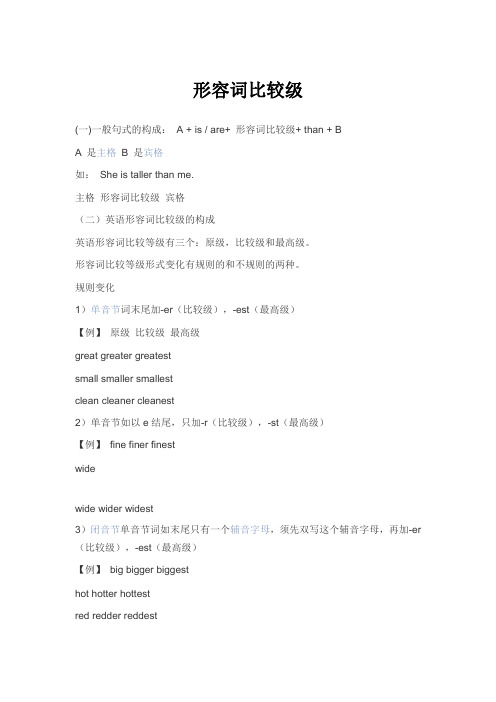
形容词比较级(一)一般句式的构成:A + is / are+ 形容词比较级+ than + BA 是主格B 是宾格如:She is taller than me.主格形容词比较级宾格(二)英语形容词比较级的构成英语形容词比较等级有三个:原级,比较级和最高级。
形容词比较等级形式变化有规则的和不规则的两种。
规则变化1)单音节词末尾加-er(比较级),-est(最高级)【例】原级比较级最高级great greater greatestsmall smaller smallestclean cleaner cleanest2)单音节如以e结尾,只加-r(比较级),-st(最高级)【例】fine finer finestwidewide wider widest3)闭音节单音节词如末尾只有一个辅音字母,须先双写这个辅音字母,再加-er (比较级),-est(最高级)【例】big bigger biggesthot hotter hottestred redder reddest4)少数以-y,-er,ow,-ble结尾的双音节词,末尾加-er(比较级),-est(最高级)。
以-y结尾的词,如-y前是辅音字母,则变y为-i,再加-er和-est。
以-e 结尾的词只加-r和-st。
【例】clever cleverer cleverestnarrow narrower narrowestable abler ablesteasy easier easiest5)其它双音节和多音节词皆在前面加单词more和most。
【例】careful more careful most carefuldifficult more difficult most difficultdelicious more delicious most delicious不规则变化原级比较级最高级good/well better bestbad worse worstmany/much more mostlittle less leastfar farther/further farthest/furthest注:有些形容词一般没有比较等级。
高中英语知识点归纳形容词与副词的比较级与最高级

高中英语知识点归纳形容词与副词的比较级与最高级形容词与副词的比较级和最高级是英语语法中非常重要的知识点。
在日常语言交流和学术写作中,我们经常会用到这两种形式来表达事物之间的程度、大小、速度等差异。
本文将对形容词和副词的比较级和最高级进行细致的归纳和总结。
一、形容词比较级的构成1. 较短形容词:在形容词后面加上-er。
例如:smart- smarter(聪明-更聪明)、big- bigger(大-更大)2. 以“e”结尾的形容词:直接在形容词后面加-r。
例如:brave- braver(勇敢-更勇敢)、nice- nicer(好-更好)3. 以辅音字母+元音字母+辅音字母结尾的形容词:双写最后一个辅音字母再加-er。
例如:big- bigger(大-更大)、hot- hotter(热-更热)4. 较长的形容词:在形容词前面加more。
例如:beautiful- more beautiful(美丽-更美丽)、expensive- more expensive(贵-更贵)二、形容词最高级的构成1. 较短形容词:在形容词后面加上-est。
例如:smart- smartest(聪明-最聪明)、big- biggest(大-最大)2. 以“e”结尾的形容词:直接在形容词后面加-st。
例如:brave- bravest(勇敢-最勇敢)、nice- nicest(好-最好)3. 以辅音字母+元音字母+辅音字母结尾的形容词:双写最后一个辅音字母再加-est。
例如:big- biggest(大-最大)、hot- hottest(热-最热)4. 较长的形容词:在形容词前面加most。
例如:beautiful- most beautiful(美丽-最美丽)、expensive- most expensive(贵-最贵)三、副词比较级和最高级的构成1. 一般情况下,在副词前面加上more构成比较级,加上most构成最高级。
形容词的比较级和最高级的变化规则
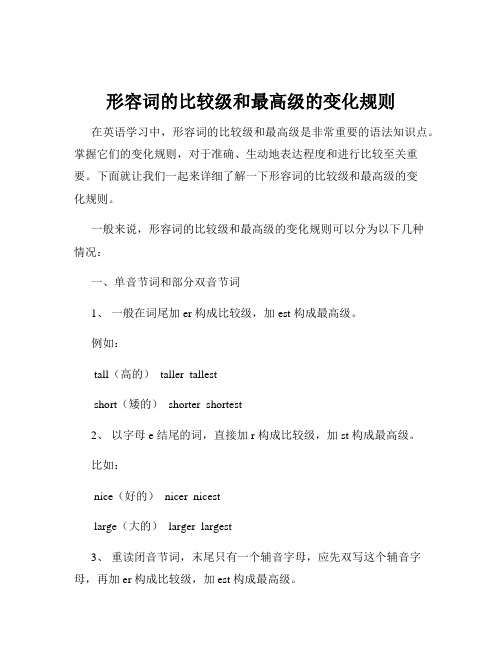
形容词的比较级和最高级的变化规则在英语学习中,形容词的比较级和最高级是非常重要的语法知识点。
掌握它们的变化规则,对于准确、生动地表达程度和进行比较至关重要。
下面就让我们一起来详细了解一下形容词的比较级和最高级的变化规则。
一般来说,形容词的比较级和最高级的变化规则可以分为以下几种情况:一、单音节词和部分双音节词1、一般在词尾加 er 构成比较级,加 est 构成最高级。
例如:tall(高的) taller tallestshort(矮的) shorter shortest2、以字母 e 结尾的词,直接加 r 构成比较级,加 st 构成最高级。
比如:nice(好的) nicer nicestlarge(大的) larger largest3、重读闭音节词,末尾只有一个辅音字母,应先双写这个辅音字母,再加 er 构成比较级,加 est 构成最高级。
常见的有:big(大的) bigger biggesthot(热的) hotter hottestfat(胖的) fatter fattest4、以“辅音字母+y”结尾的双音节词,先把“y”变为“i”,再加 er 构成比较级,加 est 构成最高级。
举例:easy(容易的) easier easiestheavy(重的) heavier heaviestbusy(忙碌的) busier busiest二、多音节词和部分双音节词对于多音节词和部分双音节词,在词前加 more 构成比较级,加most 构成最高级。
例如:beautiful(美丽的) more beautiful most beautifulimportant(重要的) more important most importantinteresting(有趣的) more interesting most interesting需要注意的是,有些形容词的比较级和最高级是不规则变化的,需要特别记忆。
比如:good(好的) better bestbad(坏的) worse worstmany/much(许多) more mostlittle(少的) less leastfar(远的) farther/further farthest/furthest此外,还有一些形容词本身就有比较级和最高级的形式,无需进行变化。
形容词的比较级和最高级

形容词的比较级和最高级在我们的日常交流和语言表达中,形容词扮演着十分重要的角色。
它们能够帮助我们更生动、准确地描述事物的特征和性质。
而形容词的比较级和最高级,则让我们的描述更加丰富、细致,能够在不同程度上对事物进行比较和强调。
首先,让我们来了解一下什么是形容词的比较级。
比较级用于两者之间的比较,表示“更……”的意思。
比如说,“这个苹果比那个苹果大”,这里的“大”就是形容词,而“更大”就是“大”的比较级,即“bigger”。
通常,形容词的比较级的构成有一定的规则。
对于单音节和部分双音节形容词,一般在词尾加“er”。
比如“tall”(高的)变成“taller”(更高的),“short”(短的)变成“shorter”(更短的)。
以字母“e”结尾的形容词,直接加“r”,像“nice”(好的)变成“nicer”(更好的)。
重读闭音节词,末尾只有一个辅音字母,要双写这个辅音字母再加“er”,比如“big”(大的)变成“bigger”(更大的),“hot”(热的)变成“hotter”(更热的)。
而对于多音节形容词和部分双音节形容词,它们的比较级则是在前面加“more”。
例如“beautiful”(美丽的),其比较级是“more beautiful”(更美丽的),“important”(重要的)变成“more important”(更重要的)。
有了比较级,那最高级又是怎么回事呢?最高级用于三者或三者以上的比较,表示“最……”。
比如“这个苹果是三个苹果中最大的”,这里的“最大的”就是“大”的最高级,即“biggest”。
最高级的构成规则也有规律可循。
单音节和部分双音节形容词,在词尾加“est”。
比如“small”(小的)变成“smallest”(最小的),“fast”(快的)变成“fastest”(最快的)。
以“e”结尾的形容词,直接加“st”,像“wide”(宽的)变成“widest”(最宽的)。
重读闭音节词,末尾只有一个辅音字母,要双写这个辅音字母再加“est”,例如“fat”(胖的)变成“fattest”(最胖的)。
形容词比较级的特殊变化

形容词比较级的特殊变化
1.
单音节形容词和少数双音节形容词,一般在词尾加-er。
如:tall - taller, fast - faster。
2.
以字母e结尾的单音节形容词,在词尾加-r。
如:large - larger, fine - finer。
3.
以重读闭音节结尾,且末尾只有一个辅音字母的双音节或多音节形容词,先双写末尾的辅音字母,再加-er。
如:big - bigger, hot - hotter。
4.
以“辅音字母+y”结尾的双音节形容词,把y变成i,再加-er。
如:happy - happier, busy - busier。
但是,如果单词以元音字母+y结尾,则直接加-er。
如:easy - easier。
5.
部分双音节和多音节形容词,前面加more构成比较级。
如:beautiful - more beautiful, careful - more careful。
6.
不规则变化的形容词比较级。
如:good - better, bad - worse, far - farther/further, little - less。
高二知识点形容词的比较级和最高级

高二知识点形容词的比较级和最高级随着学习的深入,高中生们开始接触到更多的英语知识点,形容词的比较级和最高级就是其中之一。
形容词的比较级和最高级是用来比较两个或多个事物之间的差异的工具。
在本文中,我们将详细介绍高二阶段学生需要注意的形容词比较级和最高级的用法。
一、形容词的比较级1. 一般比较级的构成形容词的一般比较级通常在词尾加上-er,例如:bigger(更大的)、faster(更快的)、happier(更快乐的)等。
2. 以“e”结尾的形容词的比较级以“e”结尾的形容词在比较级形式中只需加上-r,例如:nicer(更好的)、larger(更大的)等。
3. 以辅音字母结尾的形容词的比较级以辅音字母结尾的形容词通常需双写词尾的辅音字母,并加上-er,例如:bigger(更大的)、fatter(更胖的)等。
4. 多音节形容词的比较级多音节形容词前面加上more,例如:more beautiful(更美丽的)、more intelligent(更聪明的)等。
5. 不规则比较级形式一些形容词的比较级形式无规律可寻,需要记忆,例如:good(好的)- better(更好的)、bad(坏的)- worse(更糟糕的)、many(多的)- more(更多的)等。
二、形容词的最高级1. 一般最高级的构成形容词的一般最高级通常在词尾加上-est,例如:biggest(最大的)、fastest(最快的)、happiest(最快乐的)等。
2. 以“e”结尾的形容词的最高级以“e”结尾的形容词在最高级形式中只需加上-st,例如:nicest(最好的)、largest(最大的)等。
3. 以辅音字母结尾的形容词的最高级以辅音字母结尾的形容词通常需双写词尾的辅音字母,并加上-est,例如:biggest(最大的)、fattest(最胖的)等。
4. 多音节形容词的最高级多音节形容词前面加上the most,例如:the most beautiful(最美丽的)、the most intelligent(最聪明的)等。
形容词比较级和最高级的用法总结

形容词比较级和最高级的用法总结形容词比较级和最高级的用法篇一1. 规则变化1)单音节词和少数双音节词,加词尾-er,-est来构成比较级和最高级。
构成法原级比较级最高级一般单音节词末尾加-er,-est tall(高的) taller tallest great(巨大的) greater greatest2)以不发音的e结尾和以- le结尾的双音节词只加-r,-st nice(好的) nicer nicest ,able(有能力的) abler ablest3)以一个辅音字母结尾的闭音节单音节词,双写结尾的辅音字母,再加-er,-est big(大的) bigger biggest hot热的) hotter hottest4)"以辅音字母+y"结尾的双音节词改y为i,再加 -er,-esteasy(容易的) easier easiest ,busy(忙的) busier busiest5)少数以-er,-ow 结尾的双音节词末尾加-er,-est clever(聪明的) cleverer cleverest narrow(窄的) narrower narrowest6)其他双音节词和多音节词,在前面加more,most 来构成比较级和最高级important(重要的) more important most important easily(容易的) more easily most easily2. 不规则变化原级比较级最高级good(好的)/ better bestwell(健康的) bad (坏的)/ worse worst ill(有病的) old (老的) older/elder oldest/eldest much/many(多的) more most little(少的) less least far (远的) farther/further farthest/furthest3.比较级形容词或副词 + than You are taller than I. They lights in your room are as bright as those in mine. 注意:1)要避免重复使用比较级。
形容词比较级知识详解

一.形容词比较级的变化1. 规则变化(1)在形容词后直接加-er。
如:tall-----taller,short------shorter等。
(2)以不发音的字母e结尾的只需在末尾加-r。
如:nice------nicer,large-------larger等。
(3)以“辅音字母+y”结尾的形容词,要先把y变成i,然后再加-er。
如:heavy------heavier,happy------happier等。
(4)若以重读闭音节结尾且只有一个辅音字母,先双写这个辅音字母,然后再加-er。
如:fat------fatter,big---bigger, thin---thinner,hot------hotter,wet---wetter, sad---sadder,red---redder等。
(5)多音节和部分双音节的形容词,可不是在u末尾变化,而是在前面加more。
如:careful-----more careful,serious-------more serious, fun---more fun等。
2. 不规则变化good /well------better, bad /badly-------worse, many /much-------more,little------less二.形容词比较级的用法在描述单个的某人或某物所具有的特征时,需要用形容词原级形式,当把两者进行比较时,就用比较级,常见的表示这类用法的句型有:1.“A+be+比较级+than+B”表示“A比B更…”。
如:This book is funnier than that one. 这本书比那本书更有趣。
2.“Which /Who(se)+be+比较级, A or B?”意思是“A和B,哪个更…….”。
如:Which is bigger, the sun or the earth? 太阳和地球,哪个更大?Whose bag is heavier, yours or mine? 谁的包重些,你的还是我的?3.“A+be+the+比较级+of the two(……)”意思是“A是两者中较…….的一个。
形容词比较级讲义
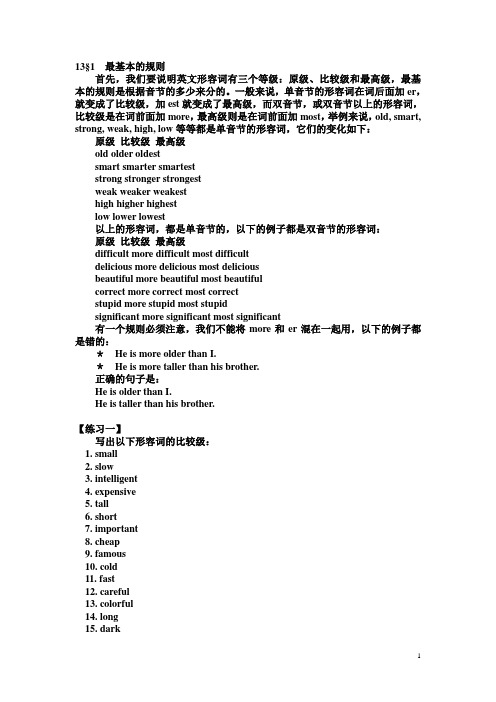
13§1 最基本的规则首先,我们要说明英文形容词有三个等级:原级、比较级和最高级,最基本的规则是根据音节的多少来分的。
一般来说,单音节的形容词在词后面加er,就变成了比较级,加est就变成了最高级,而双音节,或双音节以上的形容词,比较级是在词前面加more,最高级则是在词前面加most,举例来说,old, smart, strong, weak, high, low等等都是单音节的形容词,它们的变化如下:原级比较级最高级old older oldestsmart smarter smarteststrong stronger strongestweak weaker weakesthigh higher highestlow lower lowest以上的形容词,都是单音节的,以下的例子都是双音节的形容词:原级比较级最高级difficult more difficult most difficultdelicious more delicious most deliciousbeautiful more beautiful most beautifulcorrect more correct most correctstupid more stupid most stupidsignificant more significant most significant有一个规则必须注意,我们不能将more和er混在一起用,以下的例子都是错的:*He is more older than I.*He is more taller than his brother.正确的句子是:He is older than I.He is taller than his brother.【练习一】写出以下形容词的比较级:1. small2. slow3. intelligent4. expensive5. tall6. short7. important8. cheap9. famous10. cold11. fast12. careful13. colorful14. long15. dark16. bright13§2 特殊的比较级规则在上一节,我们说明了最基本的规则,那就是单音节形容词加er 或est ,双音节的形容词前面加more 或most 。
- 1、下载文档前请自行甄别文档内容的完整性,平台不提供额外的编辑、内容补充、找答案等附加服务。
- 2、"仅部分预览"的文档,不可在线预览部分如存在完整性等问题,可反馈申请退款(可完整预览的文档不适用该条件!)。
- 3、如文档侵犯您的权益,请联系客服反馈,我们会尽快为您处理(人工客服工作时间:9:00-18:30)。
L/O/G/O
Unit 5
Sophie
what's the word?
The food is very_ _ _ _ _. My neighbor is very _ _ _ _ _ _ _ _.
My girl friend is very _ _ _ _ _ _ _ _ _ _ _.
him she it us they we
What happened in Brownsville?
Brownsville
Newport
The streets The parks The bus system The people
past
now
What do you do under such circumstance? ['sə:kəmstəns] ['sɝkəm,stæns]
14. Jim runs _____(slow). But Ben runs _____(slow). 15.The child doesn’t______ (write) as ____(fast) as the students.
Congratulations!
主格 I
宾格 me
形容词性 名词性物 反身代词 物主代词 主代词 my minathetic[,sɪmpə’θɛtɪk]
2.Understanding
3.as…as…
4.…is …than…
5.…is much/a little/a bit/ even/still more than…
It isn't easy making choices, too.
HOMEWORK CHECKING
IT ISN’T EASY BEEN A TEENAGER
I try to be _____, but my parents never ________,they think I should be ___.they think I should, I should , and I should . And_______them, should be______, should be_____, and should be _____when they ________. You know,__________________________-
This girl is really _ _ _ _ _ _ _ _.
可爱的______________________ 聪明的__________________________ 美味的
_______________懒惰的_______________________
令人兴奋的 ___________ 轻的___________________________
You and your family are having a picnic in the park and then your car is stolen.
4
Listen!
What are they talking about?
________ isn’t as______as _______
________ aren’t as______as _______
1. My brother is two years __________(old) than me. 2. Tom is as ________(fat) as Jim. 3. Is your sister __________(young) than you? Yes, she is. 4. Who is ___________(thin), you or Helen? Helen is. 5. Whose pencil-box is _________(big), yours or hers? Hers is. 6. Mary’s hair is as __________(long) as Lucy’s.
7.Ben ______ (jump) ________ (high) than some of the boys in his class. 8.______ Nancy sing __________ (well) than Helen? Yes, she _____. 9.Fangfang is not as _________ (tall) as the other girls. 10.My eyes are __________(big) than ________ (she).. 11.Which is ___________(heavy), the elephant or the pig? 12.Who gets up _________(early), Tim or Tom? 13._____the girls get up_______ (early) than the boys? No,they______.
时尚的 ______________礼貌的__________________________
友好的 ______________有力量的_______________________
好客的 _______________柔软的_______________________
辣的 _______________ 有才华的________________________ 健谈的 _______________有魅力的_______________________
1
Your neighbor has a annoying dog and it barks every night.
The people nearby throw rubbish out of their windows and make the streets very
dirty.
2
3
You had breakfast at KFC and then you had a stomachache.
